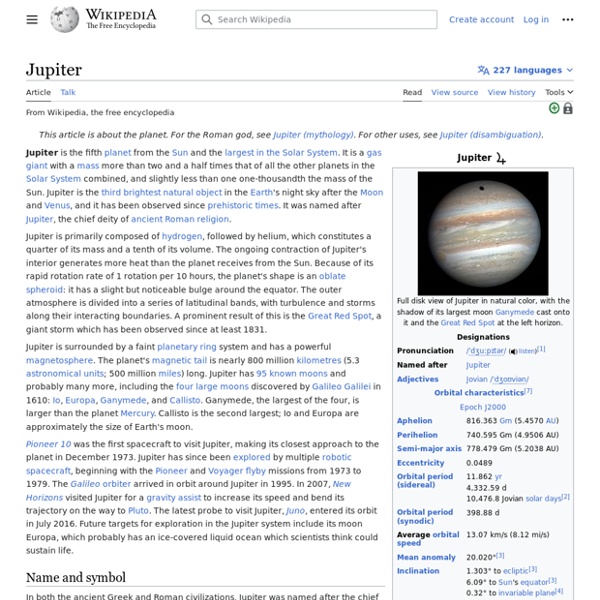Leto
Greek mythological figure and mother of Apollo and Artemis The island of Kos is claimed to be her birthplace. However, Diodorus, in 2.47 states clearly that Leto was born in Hyperborea and not in Kos.[2] In the Olympian scheme, Zeus is the father of her twins,[3] Apollo and Artemis, which Leto conceived after her hidden beauty accidentally caught the eye of Zeus. Classical Greek myths record little about Leto other than her pregnancy and search for a place where she could give birth to Apollo and Artemis, since Hera in her jealousy caused all lands to shun her.
Proserpina
Ancient Roman goddess Cult and myths[edit] Origin as Libera[edit] Libera was officially identified with Proserpina in 205 BC, when she acquired a Romanised form of the Greek mystery rites and their attendant mythology.
Juno
From Wikipedia, the free encyclopedia Jump to navigationJump to search Juno may refer to:
Deucalion
Deucalion from "Promptuarii Iconum Insigniorum" Etymology[edit] According to folk etymology, Deucalion's name comes from δεῦκος, deukos, a variant of γλεῦκος, gleucos, i.e.
Pygmalion
Pygmalion or Pigmalion may refer to: Mythology[edit] Stage[edit]
Venus
Second planet from the Sun in the Solar System Venus is a terrestrial planet and is sometimes called Earth's "sister planet" because of their similar size, mass, proximity to the Sun, and bulk composition. It is radically different from Earth in other respects.
Artemis
Deity in ancient Greek religion and myth Artemis is the daughter of Zeus and Leto, and the twin sister of Apollo. She was the patron and protector of young girls, and was believed to bring disease upon women and relieve them of it. Artemis was worshipped as one of the primary goddesses of childbirth and midwifery along with Eileithyia. Much like Athena and Hestia, Artemis preferred to remain a maiden and is sworn never to marry. Artemis was one of the most widely venerated of the Ancient Greek deities and her temple at Ephesus was one of the Seven Wonders of the Ancient World.
Pyramus and Thisbe
Plot[edit] In Ovid's Metamorphoses, Pyramus and Thisbe are two lovers in the city of Babylon who occupy connected houses/walls, forbidden by their parents to be wed, because of their parents' rivalry. Through a crack in one of the walls, they whisper their love for each other. They arrange to meet near Ninus' tomb under a mulberry tree and state their feelings for each other. Thisbe arrives first, but upon seeing a lioness with a mouth bloody from a recent kill, she flees, leaving behind her veil.
Vesta
From Wikipedia, the free encyclopedia Jump to navigationJump to search Vesta may refer to:
Deianira
Ancient Greek mythical character Deianira, Deïanira, or Deianeira[1] (/ˌdeɪ.əˈnaɪrə/;[2] Ancient Greek: Δηϊάνειρα, Dēiáneira, or Δῃάνειρα, Dēáneira, [dɛːiáneːra]), also known as Dejanira,[3] was a figure in Greek mythology whose name translated as "man-destroyer"[4] or "destroyer of her husband".[5][6] She was the wife of Heracles and, in late Classical accounts, his unwitting murderer, killing him with the poisoned Shirt of Nessus. She is the main character in Sophocles' play Women of Trachis. Mythology[edit] Family and marriage[edit]



